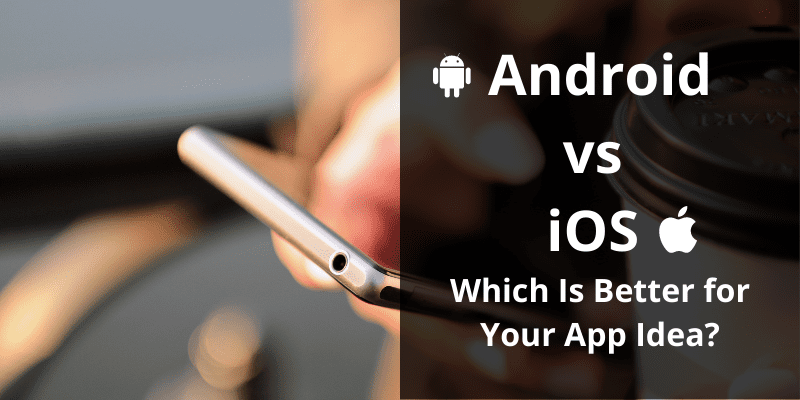One of the first choices you must make when creating an app is whether to build for iOS or Android. Although your ultimate aim could be to launch on both platforms, building an app for both iOS and Android at the same time is risky and costly. Instead, most developers choose to create an app for one platform first, then launch it on the other platform later, after the first version of the app has proven to be popular. For instance, app users on Android and iOS behave differently.
As a result, if you launch on the incorrect site, you risk alienating your primary target audience. If only there was a solution that didn’t need you to make a decision.
What factors do you consider when deciding whether to launch your app first on Android or iOS?
Both platforms have advantages and disadvantages, but fundamentally, the decision is based on five factors:
- The target audience
- Timetable
- Features that are desired
- Maintaining your app on a budget
- Revenue goal
There are significant variations between the types of users that Android and iOS draw.
Android smartphones, for example, have the largest global market share. Apple, on the other hand, dominates the App Store in terms of consumer spending.
When determining which channel to build for first, think about your target audience’s geographic and demographic characteristics. Android can be your best bet if you’re looking to reach a global audience.
Pros Of Developing Android Apps vs iOS Apps
- Open System
In Android, some key features that are restricted in iOS are typically available. Mobile app developers are ecstatic about this because it gives them more freedom and opportunity to create bigger and better things.
- Design
In terms of design, Google offers guidance. Even if you don’t have much experience, you can build a pleasing layout and an outstanding user interface this way.
- Fragmentation
One sensitive app can run on a wide variety of devices (different hardware).
When your software is finished and the development team uploads the Android Package (APK), it’s normally only a matter of hours before users can download and use it.
Cons Of Developing Android Apps vs iOS Apps
● Fragmentation
While it was classified as again, fragmentation may also be a drawback. Consider all of the various screen sizes, resolutions, and aspect ratios that must function properly after each update. You don’t want the app to behave in a way that you don’t want it to.
Testing is somewhat similar to fragmentation. It’s difficult to test anything as quickly as developers would like because there are so many different devices that run on different Android versions and have different hardware. This is a time-consuming problem.
● Costly
When you combine fragmentation and testing, you end up with higher costs than on iOS, which has fewer iterations and devices running it.
Pros Of Developing iOS Apps vs Android apps
● Profits
Apple users’ loyalty allows them to spend more money on games. They adore and trust the Apple brand, as well as the App Store’s software. Furthermore, the majority of Apple device users reside in western, more developed, and wealthy countries where people earn more money.
● Fragmentation
The majority of devices run the same version of iOS, and they’re all designed for the iPhone and iPad. They don’t have to consider tens of thousands of different devices, screen sizes, and resolutions.
● Simulator
The iOS emulator is preferable to the Android emulator for debugging. This is something that the majority of business leaders agree on.
● Standardized User Interface Design
There are extremely comprehensive UI design guidelines available, so developers don’t have to spend too much time worrying about it. They have more time and energy to devote to the product itself.
Cons Of Developing iOS Apps vs Android Apps
● Expensive
The X code IDE is only available for Mac computers. This raises your initial investment substantially before you even begin growing.
Apps that developers build must pass rigorous testing to be released. When an app does not follow the requirements, Apple and iOS are very strict, and several applications are refused.
● Standardization
As a result of the standardization requirements, many apps lose their initial imagination and become “just like the rest.” Many developers are turned off by the lack of customization.
Even though both Android and iOS have very loyal customers who can be found fighting in heated debates over the internet about which is better, there is a heated debate online about Android vs iOS growth, with Android vs iOS pros and cons being obvious, both Android and iOS have very loyal customers who can be found fighting in heated debates over the internet about which is better. While Android users are less likely to spend money in the Play Store, getting more customers to reach with mobile advertising can be a great strategy. Developers who focus their efforts on iOS can expect more app purchases and in-app purchases and can prepare accordingly.
Read More: How to disable safe mode on android devices
Advantages of Android
- Android Allows For More Customization Almost everything can be changed.
- Any new publication in Android can be done quickly and without going through a review process.
- For SMS, use a different messaging app.
- Android is a website that is free to use.
- Cost-effective entry to the Android App Market
- The option to save RAW images will be included in future versions.
- Beta testing and staged rollouts are built-in.
Advantages of iOS
- Excellent user interface and fluid responsiveness
- Since there are fewer templates, developers can build apps.
- For Apple devices, metal and a gleaming finish are ideal.
- Customization requires jailbreaking.
- When compared to Android, it produces less heat and is ideal for media entertainment.
- Company and gaming suits
- iOS Is More “Intuitive” than Android.
Disadvantages of Android
- In most cases, Java needs more code than Objective-C.
- In Android, complex layouts and animations are more difficult to code.
- Virus-infected apps are also available in the Android Market.
- There are several “processes” running in the background, which causes the battery to rapidly drain.
- Advertisements will still be available, either at the top or bottom of the app.
Disadvantages of iOS
- It has an approval process; when developers choose to launch an app, they must submit it to Apple for review, which may take up to 7 days in some cases.
- When compared to other mobile platforms, the applications are very broad.
- Using iOS is expensive. Apps aren’t supported, and widgets aren’t accessible.
- On 3G, battery efficiency is low, and repair costs are high.
- Just supports iOS devices, so it’s not very versatile.
Conclusion
So, should I go with iOS or Android mobile app development? In the Android vs. iOS fight, there is no clear winner. It’s important to set aside personal interests and see the big picture. The Android platform is the way to go if you want to customize your app further, wait less time for it to be accepted, and reach a larger audience. Users who do not update their Android versions force you to spend more money.







